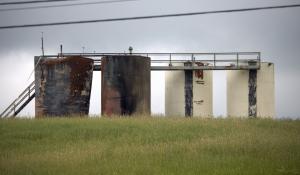.jpg4ea5.webp?itok=aiV52XKk)
When climate disaster strikes, policyholders expect the property insurance they paid for to help them recover and rebuild. And as we’ve seen from the wildfires in Los Angeles and flash flooding tragedies in Texas to hurricane Helene destroying communities in and around Asheville, no one is immune to the risk of damage from extreme weather. What many don’t realize is the part insurance companies play in making the climate crisis worse.
According to The New York Times, over 1.9 million home insurance contracts have been “nonrenewed” nationwide since 2018, and the nonrenewal rate across 200 U.S. counties has tripled. At the same time, the nation’s largest insurers continue to both insure fossil fuel projects and invest billions in fossil fuel companies. Together the largest insurance companies have invested $582 billion in fossil fuels.
The largest insurance companies that fuel the climate crisis have raised rates sharply in the last few years, in part due to the climate crisis causing more disasters nationwide—a crisis those insurance companies are complicit in by investing billions in fossil fuels. Those practices are driving people to drop coverage or underinsure because they simply can’t afford to be properly insured.
But going without insurance simply isn’t an option for many people. For instance, home insurance is required to obtain a mortgage, and insurers pulling out of a community can trigger a wave of social and economic divestment that only puts people at further risk.
That’s why Green America created the Climate Smart Insurance Directory. It lists options for insurance companies in every state that do not insure fossil fuel projects and invest little to nothing in the fossil fuel industry. Cathy Becker, responsible finance campaign director at Green America, says the directory helps folks find alternatives to big corporate insurers for the policies they need.
Michi Trota: Obtaining property insurance isn’t an easy task to begin with. How can people know when it’s the right time to search for a new policy?
Cathy Becker: Any time is a good time to shop for property insurance—but it’s especially ideal when:
You are nearing the month for your annual insurance to renew; If your insurance rates have sharply increased, whether you have recently filed a claim or not; If your insurance company has informed you that it will not renew your policy.
Shopping for property insurance is easier than you might think. Start by calling three independent agents in your area and ask them for a quote from a regional mutual insurance company for home or renters and auto insurance.
Each agent works with different companies, so talking to more than one will give you a better idea of what is available in your area. There’s no obligation to buy a particular policy through a particular agent just because you get a quote.
Trota: Why should buyers consider going local for home, renters, or auto insurance instead of getting policies through large corporations like GEICO, Liberty Mutual, and State Farm?
Becker: Going local for insurance has similar benefits to buying from local businesses and banking locally:
Divesting from fossil fuels. Almost all of the household names in property insurance both insure fossil fuel projects and invest in the fossil fuel industry. While finding which companies insure a particular project can be difficult, their investments can be found at Investing in Climate Chaos, a resource from the German nonprofit Urgewald.
The numbers are stark. Liberty Mutual insures numerous fossil projects, such as several Gulf Coast LNG export terminals, and invests $1.8 billion in fossil fuels. State Farm has $20.6 billion invested in fossil fuels. Berkshire Hathaway, parent of GEICO, has $95.8 billion invested in fossil fuels, and it is the top investor in Chevron and Occidental Petroleum.
Investing in your community. Local and regional insurance companies have been quietly serving their communities for decades, some for more than a century. They may not be household names because they do not spend millions on advertising, but they are just as financially stable as their larger counterparts.
Saving money. While not guaranteed, going local for your property insurance can often save hundreds of dollars on the annual cost of a policy.
Trota: When evaluating policy options, what are the most important points that buyers should look for?
Becker: In comparing quotes from different insurers, look for:
- Cost. You may not go with the cheapest option, but cost is always a factor. You can cut costs by bundling home or renters’ insurance with auto insurance, paying in monthly installments, and asking for any discounts such as through AARP. Signing up for autopay options can also save on cost.
- Coverage. Make sure the quote covers the cost of rebuilding your home and/or replacing personal property, as well as temporary living expenses, medical payments, and liability claims. Keep in mind that the cost of building materials, furniture, clothing, and electronics is increasing. In addition, most policies do not cover floods or earthquakes, which require separate insurance.
- Financial stability. Look up the company’s rating on AM Best (you will need to create an account). Steer clear of companies with a rating below A-.
- Safety ratings. Weiss Safety Ratings indicate an insurance company’s ability to meet obligations to policyholders. Any A or B rating is acceptable.
- Denial rates. Weiss Ratings also has a list of property insurance denial rates. Steer clear of any company denying 40% or more of claims.
- Coverage requirements. Some insurance companies now require property updates that relate to climate and energy use, such as updated windows, roofing, and heating and/or hot water systems. Be sure to ask what, if any, requirements must be met and how much time you have to complete them to obtain coverage.
Trota: If it’s not possible to switch to an insurance company that doesn’t invest in fossil fuels, how can policy holders advocate for insurers to invest in their communities and the environment?
Becker: Find out how much your insurance company has invested in fossil fuels at InvestingInClimateChaos.org/data. Then call the company and tell them as a policyholder you expect them to do better and are canceling your policy because of their investment in fossil fuels. Insurance companies that must cover damage from the climate crisis should not be actively making the climate crisis worse. In most cases, fossil fuels are a small part of their investment portfolios. There’s no reason they cannot move that money elsewhere.
You can also call your state insurance commissioner to express your concerns. Insurance is regulated on the state level, but state commissioners rarely hear from the public. Your call can make an impression. Find your state insurance commissioner by going to the National Association of Insurance Commissioners’ website.


f3eb.jpg?h=b2b20470&itok=5NLHIfwx)
6626.jpg?itok=uLIBe4rS)



